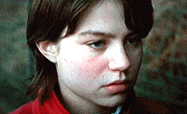The film opens with a chaotic scene: Rosetta (Emilie Dequenne), dismissed from her station after her employment trial period has elapsed, refuses to leave the factory, and is escorted off the premises by security guards. Shot through a handheld camera, the confusion seems to continue as we follow Rosetta as she crosses a busy intersection, makes her way through the woods, changes into her water-repellent boots that she hides in an exposed concrete pipe, and returns to her rented trailer home that she shares with her alcoholic mother (Anne Yernaux). It is a bleak life, and one that she desperately wants to escape. If she could only find a job. But Rosetta is a resourceful young woman, and remains undeterred by the latest setback. She returns to town with a bagful of repaired clothes to be sold to the local thrift store, and canvasses local merchants for job openings. Riquet (Fabrizio Rongione), a waffle vendor, takes interest in Rosetta, and when the food preparer is fired for absenteeism, he encourages her to apply. However, the job proves temporary as well, as the owner (Olivier Gourmet) is compelled to hire his own son. Without any new prospects, she sacrifices her friendship with Riquet to obtain a job.
Jean-Pierre and Luc Dardenne create an eviscerating, poignant, and unsettling portrait of poverty and survival in Rosetta. The jarring motion, quick panning, and unstable camerawork contribute to the film’s pervasive sense of transience and uncertainty. Note the heartbreaking scene where Rosetta is dismissed from her job as a waffle maker. Refusing to surrender a sack of flour, she pleads with the owner: “I want to stay. I want a job, a normal life, like yours.” It is an intensely honest moment in the life of the usually dour Rosetta, and we understand her pain. Does a normal life lie in finding a job, or does it merely represent the unattainability of happiness? To Rosetta, the meaning is sadly interchangeable… and invariably elusive.
© Acquarello 2000. All rights reserved.
